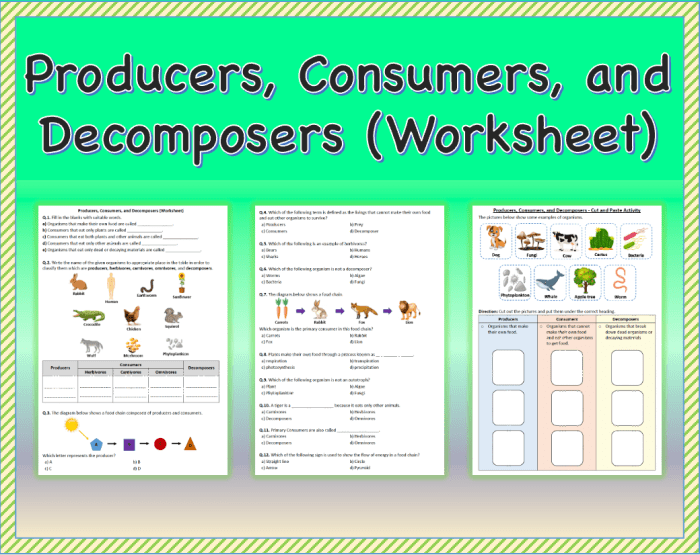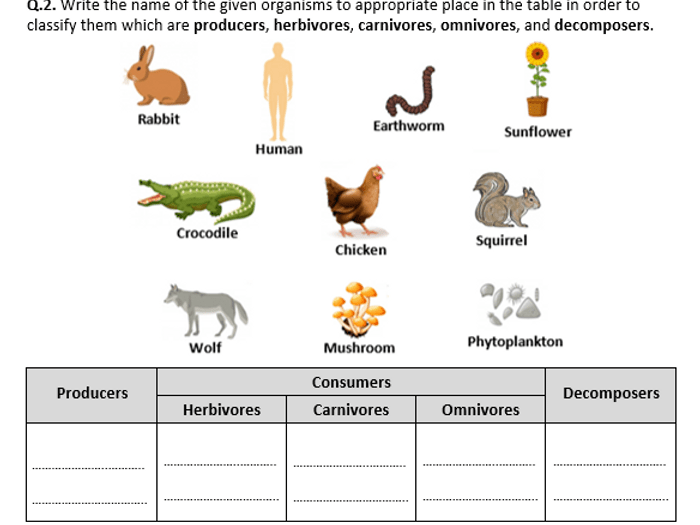Consumers producers and decomposers worksheet – Embarking on a journey into the intricate web of life, we present the Consumers, Producers, and Decomposers Worksheet, an invaluable resource for unraveling the interconnected roles of organisms within ecosystems. This worksheet delves into the fascinating world of ecology, shedding light on the crucial functions of consumers, producers, and decomposers in maintaining the delicate balance of nature.
Through engaging activities and thought-provoking questions, students will embark on a voyage of discovery, unraveling the intricate relationships between organisms and their environment. By classifying organisms into these three categories and examining their interactions, they will gain a profound understanding of how ecosystems thrive and adapt.
Consumers: Consumers Producers And Decomposers Worksheet
Consumers are organisms that obtain energy by consuming other organisms. They play a vital role in ecosystems by controlling the populations of their prey and by returning nutrients to the environment.
There are many different types of consumers, including:
- Herbivores: Animals that eat plants
- Carnivores: Animals that eat other animals
- Omnivores: Animals that eat both plants and animals
- Scavengers: Animals that feed on dead animals
- Decomposers: Organisms that break down dead organisms
Consumers are an important part of ecosystems because they help to maintain a balance between different species. Without consumers, the populations of some species would grow too large, which could lead to overgrazing or other problems.
Producers

Producers are organisms that create their own food through photosynthesis. They are the foundation of all food chains and webs, and they provide the energy that all other organisms need to survive.
There are many different types of producers, including:
- Plants: Green plants that use sunlight to create food
- Algae: Simple plants that live in water
- Phytoplankton: Microscopic plants that live in water
- Bacteria: Some bacteria can use sunlight or chemicals to create food
Producers are an important part of ecosystems because they provide the food that all other organisms need to survive. Without producers, there would be no life on Earth.
Decomposers

Decomposers are organisms that break down dead organisms and return nutrients to the environment. They play a vital role in ecosystems by recycling nutrients and making them available to other organisms.
There are many different types of decomposers, including:
- Bacteria: Bacteria are the most important decomposers. They break down all types of organic matter, including dead plants and animals.
- Fungi: Fungi are also important decomposers. They break down dead plants and animals, and they also play a role in the cycling of nutrients.
- Worms: Worms are decomposers that live in soil. They eat dead plants and animals, and they help to aerate the soil.
Decomposers are an important part of ecosystems because they help to recycle nutrients and make them available to other organisms. Without decomposers, the environment would be filled with dead organisms, and there would be no life on Earth.
Essential FAQs
What is the primary role of consumers in an ecosystem?
Consumers play a vital role in energy transfer by consuming other organisms, releasing energy into the ecosystem and maintaining population balance.
How do producers contribute to the stability of ecosystems?
Producers, primarily plants, are the foundation of food chains, converting sunlight into energy through photosynthesis, which sustains all other organisms in the ecosystem.
What is the significance of decomposers in nutrient cycling?
Decomposers, such as bacteria and fungi, break down organic matter, releasing nutrients back into the soil, which are then utilized by producers, ensuring the continuous flow of nutrients within the ecosystem.